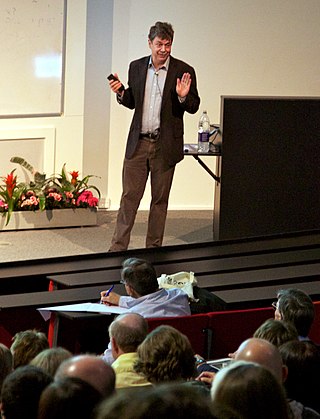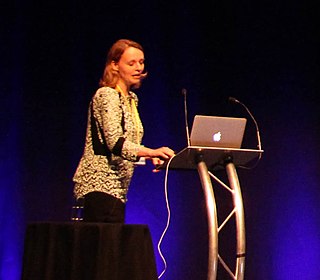
Rashid Alievich Sunyaev is a German, Soviet, and Russian astrophysicist of Tatar descent. He got his MS degree from the Moscow Institute of Physics and Technology (MIPT) in 1966. He became a professor at MIPT in 1974. Sunyaev was the head of the High Energy Astrophysics Department of the Russian Academy of Sciences, and has been chief scientist of the Academy's Space Research Institute since 1992. He has also been a director of the Max Planck Institute for Astrophysics in Garching, Germany since 1996, and Maureen and John Hendricks Distinguished Visiting Professor in the School of Natural Sciences at the Institute for Advanced Study in Princeton since 2010.

Saul Perlmutter is a U.S. astrophysicist, a professor of physics at the University of California, Berkeley, where he holds the Franklin W. and Karen Weber Dabby Chair, and head of the International Supernova Cosmology Project at the Lawrence Berkeley National Laboratory. He is a member of both the American Academy of Arts & Sciences and the American Philosophical Society, and was elected a Fellow of the American Association for the Advancement of Science in 2003. He is also a member of the National Academy of Sciences. Perlmutter shared the 2006 Shaw Prize in Astronomy, the 2011 Nobel Prize in Physics, and the 2015 Breakthrough Prize in Fundamental Physics with Brian P. Schmidt and Adam Riess for providing evidence that the expansion of the universe is accelerating. Since 2021, he has been a member of the President’s Council of Advisors on Science and Technology (PCAST).

Richard Salisbury Ellis is Professor of Astrophysics at the University College London. He previously served as the Steele Professor of Astronomy at the California Institute of Technology (Caltech). He was awarded the 2011 Gold Medal of the Royal Astronomical Society, in 2022 the Royal Medal of the Royal Society and in 2023 the Gruber Prize in Cosmology.

Robert P. Kirshner is an American astronomer, Chief Program Officer for Science for the Gordon and Betty Moore Foundation, and the Clownes Research Professor of Science at Harvard University. Kirshner has worked in several areas of astronomy including the physics of supernovae, supernova remnants, the large-scale structure of the cosmos, and the use of supernovae to measure the expansion of the universe.
The Supernova Cosmology Project is one of two research teams that determined the likelihood of an accelerating universe and therefore a positive cosmological constant, using data from the redshift of Type Ia supernovae. The project is headed by Saul Perlmutter at Lawrence Berkeley National Laboratory, with members from Australia, Chile, France, Portugal, Spain, Sweden, the United Kingdom, and the United States.

Brian Paul Schmidt is a Distinguished Professor and astrophysicist at the Australian National University's Mount Stromlo Observatory and Research School of Astronomy and Astrophysics. He was the Vice-Chancellor of the Australian National University (ANU) from January 2016 to January 2024. He is known for his research in using supernovae as cosmological probes. He previously held a Federation Fellowship and a Laureate Fellowship from the Australian Research Council, and was elected a Fellow of the Royal Society (FRS) in 2012. Schmidt shared both the 2006 Shaw Prize in Astronomy and the 2011 Nobel Prize in Physics with Saul Perlmutter and Adam Riess for providing evidence that the expansion of the universe is accelerating.

Charles L. Bennett is an American observational astrophysicist. He is a Bloomberg Distinguished Professor, the Alumni Centennial Professor of Physics and Astronomy and a Gilman Scholar at Johns Hopkins University. He is the Principal Investigator of NASA's highly successful Wilkinson Microwave Anisotropy Probe (WMAP).

Nicholas B. Suntzeff is an American astronomer and cosmologist. He is a University Distinguished Professor and holds the Mitchell/Heep/Munnerlyn Chair of Observational Astronomy in the Department of Physics & Astronomy at Texas A&M University where he is Director of the Astronomy Program. He is an observational astronomer specializing in cosmology, supernovae, stellar populations, and astronomical instrumentation. With Brian Schmidt he founded the High-z Supernova Search Team, which was honored with the Nobel Prize in Physics in 2011 to Schmidt and Adam Riess.

Simon David Manton White, FRS, is a British-German astrophysicist. He was one of directors at the Max Planck Institute for Astrophysics before his retirement in late 2019.

Christopher Stubbs is an experimental physicist currently on the faculty at Harvard University in both the Department of Physics and the Department of Astronomy. He is the current Dean of Science at Harvard University and a former Chair of Harvard's Department of Physics.
Matias Zaldarriaga is a theoretical physicist best known for his work on cosmology. He has made significant contributions toward understanding both astrophysical phenomena and fundamental physics, most notably through his research on modeling the early universe and analyzing statistical properties of cosmic microwave background data. Zaldarriaga grew up in Buenos Aires, Argentina and received his undergraduate degree from the University of Buenos Aires in 1994. He received his PhD in 1998 from the Massachusetts Institute of Technology, followed by a postdoctoral fellowship at the Institute for Advanced Study in Princeton, NJ. Zaldarriaga was a faculty member at New York University and Harvard University, where he received a MacArthur Fellowship in 2006. He is currently a professor at the Institute for Advanced Study, where he has been a faculty member since 2009.

Pilar Ruiz-Lapuente is an astrophysicist working as a professor at the University of Barcelona. Her work has included research on type Ia supernovae. In 2004, she led the team that searched for the companion star to the white dwarf that became supernova SN 1572, observed by Tycho Brahe, among others. Ruiz-Lapuente's research on supernovae contributed to the discovery of the accelerating expansion of the universe.
Craig Hogan is a Professor of Astronomy and Physics at the University of Chicago and director of the Fermilab Center for Particle Astrophysics.
Marc Kamionkowski is an American theoretical physicist and currently the William R. Kenan, Jr. Professor of Physics and Astronomy at Johns Hopkins University. His research interests include particle physics, dark matter, inflation, the cosmic microwave background and gravitational waves.

Licia Verde is an Italian cosmologist and theoretical physicist and currently ICREA Professor of Physics and Astronomy at the University of Barcelona. Her research interests include large-scale structure, dark matter, dark energy, inflation and the cosmic microwave background.
Michele Limon is an Italian research scientist at the University of Pennsylvania. Limon studied physics at the Università degli Studi di Milano in Milan, Italy and completed his post-doctoral work at the University of California, Berkeley. He has been conducting research for more than 30 years and has experience in the design of ground, balloon and space-based instrumentation. His academic specialties include Astrophysics, Cosmology, Instrumentation Development, and Cryogenics.

Hiranya Vajramani Peiris is a British astrophysicist at the University of Cambridge, where she holds the Professorship of Astrophysics (1909). She is best known for her work on the cosmic microwave background radiation, and interdisciplinary links between cosmology and high-energy physics. She was one of 27 scientists who received the Breakthrough Prize in Fundamental Physics in 2018 for their "detailed maps of the early universe."

Joanna Dunkley is a British astrophysicist and Professor of Physics at Princeton University. She works on the origin of the Universe and the Cosmic microwave background (CMB) using the Atacama Cosmology Telescope, the Simons Observatory and the Large Synoptic Survey Telescope (LSST).
Maryam Modjaz is a German-American astrophysicist who is a professor and Director of Equity and Inclusion at the New York University. Her research considers the death of massive stars. She was awarded an Alexander von Humboldt Foundation Fellowship in 2018, which she spent at the Max Planck Institute for Astronomy.

Rana X. Adhikari is an American experimental physicist. He is a professor of physics at the California Institute of Technology (Caltech) and an associate faculty member of the International Centre for Theoretical Sciences of Tata Institute of Fundamental Research (ICTS-TIFR).













